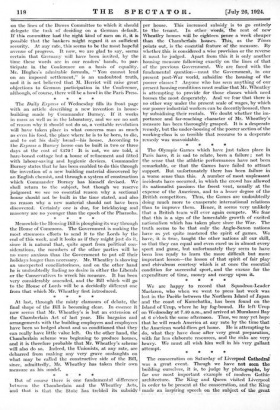Incidentally some of Mr. MacDonald's skill as a negotiator is
begiiming to appear. He has so arranged it that it is not he who has been given the task of telling unpleasant truths to the French. He has, as it were; stood aside and allowed M. Herriot to fmd himself face to face with economic facts. As we go to press it seems that his policy hai still'a chance of success. M. Theunis, the Belgian Prime Minister, is busy on formulae that will satisfy both the bankers and M. Herriot. He is bent on resorting to the plan which Mr. Baldwin recom- mended in the House of Commons last week—that the Reparations Commission should appoint a committee on the lines of the Dawes Committee to which it should delegate the task of deckling on a German default. If this committee had the right kind of men on it, it is possible that the bankers might regard it as sufficient security. At any rate, this seems to be the most hopeful avenue of progress. It now, we are glad to say, seems certain that Germany will have been invited, by the time these words are in our readers' hands, to par- ticipate in the Conference on a basis of equality. Mr. Hughes's admirable formula, " You cannot lend on an imposed settlement," is an undoubted truth, and it is not believed that M. Herriot will raise great objections to German participation in the Conference, although, of course, there will be a howl in the Paris Press.



















































